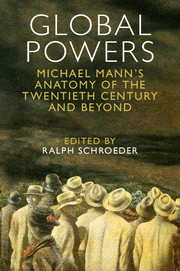Book contents
- Frontmatter
- Contents
- List of contributors
- 1 Introduction
- Part I Theory and history
- Part II Political, economic, military and ideological questions
- 5 On political decency
- 6 Mann on neoliberalism
- 7 Nationalism and military power in the twentieth century and beyond
- 8 History, historical sociology and the problem of ideology: the cases of communism and neoliberalism
- 9 Mann's globalizations and their limits
- Part III American exceptionalism
- Part IV Empire
- Part V Response
- Index
- References
5 - On political decency
from Part II - Political, economic, military and ideological questions
Published online by Cambridge University Press: 05 April 2016
- Frontmatter
- Contents
- List of contributors
- 1 Introduction
- Part I Theory and history
- Part II Political, economic, military and ideological questions
- 5 On political decency
- 6 Mann on neoliberalism
- 7 Nationalism and military power in the twentieth century and beyond
- 8 History, historical sociology and the problem of ideology: the cases of communism and neoliberalism
- 9 Mann's globalizations and their limits
- Part III American exceptionalism
- Part IV Empire
- Part V Response
- Index
- References
Summary
No sociological enterprise of this magnitude has ever been undertaken that was not animated by some – tacit or implicit – political passion. One waits absorbed to see what that will prove to be.
(Anderson 1986: 176)Although Michael Mann may yet give us another volume on social theory, the completion of the philosophical history allows attention to be given to Perry Anderson's question. A large part of the answer seems to me to be simply that of a passionate desire to understand how the world works, the intellectual drive of a great scholar. Moreover, this attitude has much to recommend it: we did not make the world, and the extent to which we are responsible for it can easily be overdone – thereby so often allowing hope to replace analysis. Still my concern here is with normative matters. What can we hope for given the constraints imposed by history? What should we value and how should we act? Mann does have views here, and I have great sympathy for them. Still, examining them may push him a little further – perhaps to add something, perhaps to say that I am mistaken.
An initial consideration is necessary. One of the pleasures of my life has been that of witnessing the unfolding of this great book. Accordingly, I have seen many twists and turns over thirty years. A very substantial one concerns ideological power. In the 1980s, Mann once told me that ideology would not play much role in the volumes that were to follow the first one, which had taken the historical account to 1760, at least in part because territorial consolidation had taken place within Europe. It is very much to his credit that intellectual discovery made him change his mind. For the massive ideological power that changed the modern world has been at the center of much of his work in the past fifteen years. Mann has been especially perceptive – as David Priestland notes in this volume – when dealing with fascism and ethnic cleansing and has done so in a wholly admirable way. Sociologists need to reconstruct the meanings at the back of the minds of actors, and this requires putting oneself into the shoes of those whom one might loath for moral reasons.
- Type
- Chapter
- Information
- Global PowersMichael Mann's Anatomy of the Twentieth Century and Beyond, pp. 89 - 106Publisher: Cambridge University PressPrint publication year: 2016

